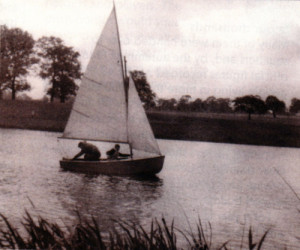
Half a century ago, my life was very much more frugal than it is today. It was in 1958, at the age of 25, that I arrived in Maidstone carrying my Revelation expanding suitcase, which contained all my worldly goods. For the record, the expanding facility did not have to be deployed.
I carried my suitcase through the town from the station and up the hill to the outskirts with never a thought of using my limited means on a taxi. In my pocket I carried my Post Office savings book, with my life savings of £30 in the account.
Also in my pocket was a letter appointing me as an assistant chief service clerk with a weighing machine company at a wage of £10 a week, terminable with one week’s notice on either side. There was no pension scheme or other benefits, and the wage and lack of job security meant that my finances would have to be carefully managed.
I had accommodation in a guest house on the outskirts of Maidstone, where I was to receive bed and breakfast and evening meal for £3 15s a week. The charges were normally higher but I had negotiated a reduced rate for the smallest room in the house, which was little more than a box room. It did have the benefit of a window over the front entrance that allowed me to view the comings and goings of the other residents.
The owners were Mr and Mrs Starling, a kindly couple who were struggling on limited means. The Starlings were Londoners who had taken the large house in Maidstone when Mr Starling had to give up his work as an upholsterer because of a chronic lung problem. Mrs Starling shouldered most of the work of the house, while her husband pottered about wearing a carpenter’s apron and doing those odd jobs that his limited strength would allow.
Making ends meet was a preoccupation for most of the occupants of the guest house too, so lifestyles were frugal and amusements simple. None of the residents had a radio or television. Apart from an occasional visit to the cinema or local pub, most of the evenings were spent in the house, with a regular forum round the dining table after dinner.
The atmosphere was strangely like a boarding school with the occasional practical joke and play acting.
My budget for the working week was very limited, so funds had to be carefully husbanded. I walked to work down the hill into town and up the other side to King Street. There was a bus, but I never dreamed of using it. Lunch was a serious expense and at first I used a Lyons cafeteria until I came upon the Cosy Cafe, which provided a hot meat and two veg course, plus pudding, at an economical price.
Saturday mornings began with a visit to W H Smith to browse through the latest paperbacks, although purchases were infrequent. This was followed by a visit to the library to stock up on books for the week’s reading, followed by a roam around the museum. Then there was a walk along the banks of the Medway to find a quiet seat for a read and a Player’s Weights cigarette.
At the bottom of the road was the ground of Maidstone United Football Club, a member of the Athenian amateur league playing teams such as Harrow and Wealdstone and Sutton United. This was my Saturday afternoon entertainment, and it cost a couple of shillings to stand on the terrace and cheer on the Stones. The more affluent supporters sat in the stand but I never contemplated such an expense.
The residents
A variety of residents came and went at the guest house and part of the interest in staying there was listening to accounts of the lives and experiences of these temporary residents. Harry, for example, was a highly intelligent young scientist who was working at the local paper mills, while Werner was from Cologne and on an exchange visit teaching German at Maidstone Grammar School. Joan was a cheerful lady who had an ambiguous relationship with a gentleman caller who arrived periodically on his motorbike but evidently had commitments elsewhere. Mr Perkins (we never got on informal terms), who was on temporary duty at Maidstone prison from his permanent post at Wandsworth, was a pleasant but large and formidable man.
Bill was also on temporary detachment, but he worked for Barclays Bank and was more affluent than the rest of us. He had the distinction of owning an elderly Ford motor car. There was also a man who was working on the Maidstone bypass, but he left under mysterious circumstances.
Looking back, most of the residents were, for various reasons, in a transitory phase in their lives. One of the saddest was an elderly lady in poor health, who appeared to be alone in the world. I once comforted her in the middle of the night when she had experienced a panic attack.
The Sir Thomas Wyatt pub on the London road or the London Tavern near Maidstone East Station were my occasional ports of call, but expenditure had to be carefully managed and a half of Fremlins special stout could be made to last most of the evening.
Fremlins was brewed in the town, one of many local industries such as Sharp’s toffee and Foster Clark’s custard.
Other free entertainment was to watch the boats sailing on the lake in Mote Park and the occasion when an American army marching band performed at a local fete. The occasional extravagances when funds allowed included one or two-day excursions with Maidstone and District buses, and the time when I saw Michael Holliday appear in person at the local Granada.
Changing circumstances meant that I only spent just over a year in Maidstone, but those days taught me how many simple pleasures can be found when times are hard.
Robert Edom, Addleston, Surrey








